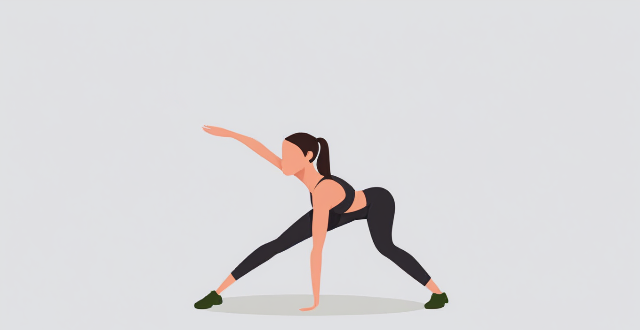Exercise Quality

How does exercise affect sleep patterns and quality ?
Exercise significantly influences sleep patterns and quality. Immediate effects include increased alertness and better body temperature regulation for sleep. Long-term, regular exercise improves sleep quality and regulates sleep patterns. Different types of exercise—aerobic, anaerobic, and mindful movements like yoga—all positively affect sleep but may require varying recovery times. The timing of exercise is crucial; morning workouts set the day's tone with minimal sleep interference, while late-night exercises can hinder sleep preparation. Tailoring workout routines to individual needs optimizes rest and overall well-being.

Is there a difference in sleep quality between aerobic and anaerobic exercise ?
Both aerobic and anaerobic exercises can improve sleep quality, but aerobic exercises are more consistently associated with better sleep duration, efficiency, and latency. Anaerobic exercises may also have benefits for sleep quality, but it is important to manage any potential negative effects such as muscle soreness and fatigue.

Can exercise compensate for poor sleep quality in terms of cognitive function ?
The article discusses the importance of sleep for cognitive function and whether exercise can compensate for poor sleep quality. While exercise has benefits for cognitive function, it cannot fully replace the memory consolidation and emotion processing that occurs during sleep. Chronic sleep deprivation can lead to long-term changes in brain structure and function that may not be reversible through exercise alone. To maintain optimal cognitive function, both regular physical activity and good sleep habits are essential.

What is the relationship between exercise, sleep quality, and emotional well-being ?
The text explores the interconnectedness of exercise, sleep quality, and emotional well-being. It outlines how physical activity enhances mood through endorphin release and long-term health benefits. Sleep quality is crucial for emotional processing and resilience against stress. Mutual benefits exist between exercise and sleep, with each improving the other. A holistic approach to health includes attention to all three components for optimal well-being.

How does exercise affect sleep quality ?
Exercise is crucial for maintaining a healthy lifestyle and has a significant impact on sleep quality. Regular physical activity can improve sleep onset, increase deep sleep, reduce stress and anxiety, regulate body temperature, and promote better breathing during sleep. To incorporate exercise into your daily routine, start slowly, choose enjoyable activities, schedule workouts, mix up your routine, be mindful of timing, listen to your body, stay hydrated, get enough rest, seek support, and track your progress.

How does an active lifestyle affect sleep quality ?
The text discusses how an active lifestyle can positively affect sleep quality. It outlines the benefits of physical activity for sleep, such as improved sleep onset, increased deep sleep, reduced sleep disturbances, enhanced REM sleep, and better sleep efficiency. The mechanisms underlying this relationship are also explored, including thermoregulation, stress reduction, neurotransmitter regulation, circadian rhythm alignment, and muscle relaxation. Practical tips for incorporating physical activity into one's routine are provided, such as choosing appropriate activities, establishing a routine, avoiding late-night workouts, being mindful of intensity, and incorporating relaxation techniques. Overall, the text emphasizes the importance of regular exercise for improving sleep quality and suggests ways to optimize its benefits.

Does exercise increase deep sleep ?
Exercise can increase deep sleep by promoting thermal downregulation and improving sleep efficiency over time. Regular exercise is recommended to enhance sleep quality, but timing is crucial to avoid sleep disruption.

Does consistent exercise regulate sleep patterns ?
Consistent exercise has been shown to have a positive impact on sleep patterns, helping regulate the body's internal clock and increase the production of sleep-promoting hormones. Regular physical activity can lead to better sleep quality, reduced stress and anxiety, and improved overall health. To reap these benefits, it's important to incorporate regular exercise into your routine, starting slowly and gradually increasing intensity and duration over time.

How does regular exercise improve the quality of life ?
Regular exercise is vital for a healthy lifestyle, enhancing physical and mental well-being significantly. It strengthens the immune system, controls weight, prevents diseases, and increases energy levels. Mentally, it reduces stress, improves mood, boosts self-esteem, and enhances brain function. Socially, it promotes interaction, provides a sense of community, and encourages healthy competition. Regular exercise is an investment that pays lifelong dividends.

How much exercise is needed to improve sleep ?
The text discusses the importance of regular physical activity in improving sleep quality. It highlights how exercise can lead to better sleep patterns, faster sleep onset, deeper sleep, and improved sleep efficiency. The amount of exercise needed varies depending on individual factors, but general guidelines suggest at least 150 minutes of moderate-intensity aerobic exercise per week. Even small amounts of physical activity can have positive effects on sleep. Various types of exercise, including aerobic exercises, resistance training, yoga, and Pilates, can contribute to improved sleep quality. Timing your exercise sessions appropriately is crucial for maximizing their benefits for sleep improvement. Consistency is key when it comes to reaping the benefits of exercise on sleep quality.

How does exercise improve cardiovascular health ?
This essay explores the ways in which exercise can improve cardiovascular health. It explains how regular physical activity strengthens the heart muscle, increases blood flow, and lowers blood pressure. The essay also discusses how exercise can reduce risk factors for cardiovascular disease, such as obesity, diabetes, and high cholesterol levels. Additionally, it highlights the positive effects of exercise on mental health and well-being, including stress reduction, depression management, and improved quality of life. Overall, the essay emphasizes the importance of regular exercise for a healthy lifestyle and encourages readers to incorporate physical activity into their daily routines.

Can regular exercise help with insomnia ?
Insomnia, a sleep disorder making it hard to fall or stay asleep, affects many. Regular exercise is emerging as a natural remedy for insomnia. Exercise can positively impact sleep quality and duration by regulating the circadian rhythm and releasing endorphins. It also reduces stress and anxiety, leading causes of insomnia. Regular exercise boosts energy levels and mental health, further promoting better sleep. The recommended amount is 150 minutes of moderate-intensity activity weekly, including muscle-strengthening exercises. Tips for exercising with insomnia include choosing low-impact activities, avoiding high-intensity workouts at night, establishing a routine, being mindful of caffeine intake, and consulting a doctor before starting an exercise program.

How does exercise impact memory and learning ?
Exercise has a positive impact on memory and learning by increasing blood flow, releasing neurotrophic factors, reducing inflammation, alleviating stress, and improving sleep quality. Incorporating physical activity into daily routine can enhance cognitive functions.

How does exercise improve mental health ?
The article discusses how exercise improves mental health by reducing symptoms of depression and anxiety, improving mood, and enhancing cognitive function. It highlights the release of endorphins, regulation of neurotransmitters, stress reduction, increased energy levels, better sleep quality, enhanced self-esteem, improved memory and attention, reduced risk of cognitive decline, and promotion of neuroplasticity as mechanisms through which exercise positively impacts mental well-being. The conclusion emphasizes the importance of regular physical activity for overall well-being and advises consulting a healthcare professional before starting any new exercise program.

Can exercise alleviate symptoms of PTSD ?
Exercise has been shown to alleviate PTSD symptoms such as flashbacks, nightmares, and avoidance behaviors. Research suggests that exercise may reduce anxiety and depression, improve mood, reduce stress, and improve sleep quality in individuals with PTSD. Endorphins released during exercise may also play a role in reducing symptoms. However, more research is needed to determine the optimal types and doses of exercise for different populations.

Can excessive exercise lead to sleep disorders ?
Overtraining can cause sleep disorders by disrupting normal sleep patterns and causing physical stress and fatigue. Relaxation techniques such as meditation, yoga, or deep breathing exercises can help calm your mind and body before bed. Adjusting your exercise routine and creating a consistent sleep schedule can also improve sleep quality. If you continue to experience sleep disturbances, consult with a healthcare professional for further evaluation and treatment.

What is the relationship between endorphins and exercise ?
The text discusses the relationship between endorphins and exercise. It explains that endorphins are hormones released in response to various stimuli, including exercise, which can produce feelings of pleasure, happiness, and relaxation. Physical activity triggers the release of endorphins, reducing pain and discomfort during exercise. The increased blood flow during exercise allows for greater endorphin production, while muscle movement sends signals to the brain to release endorphins, reducing pain perception. The release of endorphins during exercise contributes to an elevated mood, often referred to as a "runner's high." The benefits of endorphin release during exercise include pain reduction, mood enhancement, stress reduction, improved sleep quality, and increased self-esteem. Engaging in regular physical activity can stimulate the release of endorphins, leading to numerous benefits such as pain reduction, mood enhancement, stress relief, improved sleep quality, and increased self-esteem.

How does exercise improve cognitive function ?
Exercise plays a crucial role in enhancing cognitive function, including memory, attention, and problem-solving skills. It promotes brain plasticity, increases blood flow and oxygenation, reduces inflammation, and improves sleep quality. Incorporating exercise into your routine can be done through various activities such as running, swimming, or yoga. Start small and gradually increase intensity and duration, find enjoyable activities, incorporate mindful movement, make it social, set realistic goals, and consult with a professional if needed.

How does exercise help in managing stress ?
Stress is an inevitable part of life, but regular exercise can help manage it effectively. Exercise releases endorphins, reduces muscle tension, improves sleep quality, boosts self-esteem and confidence, provides a sense of accomplishment, and promotes social interaction. To incorporate exercise into your daily routine, start slowly, find an activity you enjoy, make it a part of your routine, mix up your routine, and don't overexert yourself. By doing so, you can reap the numerous benefits of exercise for stress management and overall well-being.

What are the benefits of aerobic exercise ?
Aerobic exercise, also known as "cardio," is a form of physical activity that increases your heart and breathing rate. It's any activity that keeps large muscles moving in a rhythmic manner for an extended period of time. Some examples include brisk walking, jogging, swimming, cycling, and dancing. The key benefits of aerobic exercise include improved heart health, weight management, boosted immune system, improved lung function, reduced stress, improved sleep, boosted mood, increased brain volume, slowed age-related cognitive decline, improved stamina, enhanced bone health, and promoted longevity. Incorporating aerobic exercise into your lifestyle can greatly improve your quality of life.

How does exercise influence aging and longevity ?
Exercise is crucial for maintaining good health and well-being, with numerous benefits including improved cardiovascular health and reduced risk of chronic diseases. It also has a significant impact on aging and longevity, as regular physical activity can help maintain muscle mass, improve bone density, and reduce the risk of chronic diseases. Exercise also has mental health benefits, such as improved cognitive function and reduced risk of depression and anxiety. Numerous studies have shown that exercise can lead to an increased lifespan by reducing the risk of premature death from various causes. Examples of long-lived populations, such as the Okinawans and Nicoyans, demonstrate the importance of an active lifestyle in promoting healthy aging and longevity. Incorporating exercise into your daily routine can lead to a higher quality of life during your golden years and potentially extend your lifespan.

How does exercise contribute to mental rejuvenation ?
Exercise plays a crucial role in mental rejuvenation by releasing endorphins, improving blood flow, enhancing neuroplasticity, reducing stress, improving sleep quality, facilitating social interaction, and boosting self-esteem. Regular physical activity can significantly contribute to improved cognitive functions, emotional stability, and overall mental well-being.

How does exercise benefit the health of older adults ?
Exercise plays a crucial role in maintaining the health and well-being of older adults. Regular physical activity can significantly improve their quality of life by preventing diseases, promoting longevity, and enhancing mental health. This text discusses the various benefits of exercise for seniors, including improvements in strength, endurance, mobility, balance, chronic disease management, stress reduction, emotional health, cognitive functioning, social interaction, independence, and overall quality of life. Engaging in regular physical activity is one of the most effective ways for seniors to maintain a healthy and fulfilling lifestyle as they age.

Can exercise boost the immune system ?
Exercise can indeed boost the immune system through various mechanisms, including enhanced circulation, reduced inflammation, weight management, stress reduction, improved sleep, increased self-esteem and mental health, microbiome diversity, temperature regulation, prevention of chronic diseases, and social interaction. Regular moderate exercise is generally considered beneficial for the immune system, but it's essential to consult with healthcare professionals to determine the appropriate amount and intensity of exercise for individual needs and circumstances.

What is the relationship between exercise and mental health ?
Exercise has a profound impact on mental health, enhancingExercise has a profound impact on mental health, enhancing reducing stress, improving sleep quality enhancing mood and cognitive function, reducing stress, improving sleep quality, and fostering social interaction. Regular physical activity stimulates the release of neurotransmitters like endorphins, serotonin, and dopamine, leading to improved mood, relaxation, and better cognitive abilities. It also helps manage cortisol levels, promotes deeper sleep, and provides emotional support through group activities, ultimately contributing to overall mental well-being.

Can exercise help with stress management ?
**Topic:** Can Exercise Help with Stress Management? **Summary:** * **Introduction:** The inevitability of stress and its potential impact on health highlight the importance of effective stress management. Exercise is often touted as a beneficial method for reducing stress. * **Relationship Between Exercise and Stress:** * **Physical Effects:** Exercise triggers endorphins, reduces cortisol levels, and improves sleep quality—all of which contribute to stress reduction. * **Mental Effects:** Enhanced cognitive function, increased self-esteem, and mindfulness techniques associated with exercise can aid in stress management. * **Benefits of Exercise for Stress Management:** * **Physical Benefits:** Improved cardiovascular health, weight management, and pain relief can reduce stress caused by related health issues. * **Mental Benefits:** Exercise can alleviate symptoms of anxiety and depression, improve mood, and increase resilience to stress. * **Practical Tips:** * **Setting Goals:** Start small and choose enjoyable activities to make exercise a sustainable habit. * **Consistency:** Scheduling workouts, finding an accountability partner, and tracking progress can help maintain a regular exercise routine. * **Conclusion:** Exercise is a powerful tool for managing stress, offering both physical and mental benefits. Incorporating it into one's lifestyle can significantly enhance overall well-being and resilience to life's challenges.

What role does physical exercise play in boosting mental focus ?
Physical exercise is not only beneficial for our physical health, but it also plays a crucial role in enhancing mental focus. Here's how: 1. Release of Endorphins: Regular exercise triggers the release of endorphins, which can help reduce stress and anxiety, leading to improved mental clarity and focus. 2. Increased Blood Flow to the Brain: Engaging in physical activities increases blood flow to the brain, delivering more oxygen and nutrients. This increased blood flow can help improve cognitive function, memory, and overall mental sharpness. 3. Better Sleep Quality: Exercise has been shown to promote better sleep quality and duration. Adequate sleep is essential for maintaining mental focus and concentration throughout the day. 4. Reduction of Stress and Anxiety: Physical activity helps lower levels of the body's stress hormones, such as cortisol. By reducing stress and anxiety, exercise allows individuals to maintain a clearer mind and stay focused on tasks at hand. 5. Enhanced Self-Confidence and Mood: Regular exercise can boost self-esteem and confidence, leading to a positive outlook on life. A positive mindset contributes to better mental focus and productivity. 6. Improved Cognitive Function: Studies have found that regular physical exercise can lead to improvements in various aspects of cognitive function, including attention, memory, and executive functions. These cognitive enhancements directly contribute to increased mental focus and concentration.

How does physical exercise contribute to mental well-being ?
The text discusses how physical exercise contributes to mental well-being by releasing endorphins, boosting self-esteem, improving sleep quality, facilitating social interaction, and enhancing cognitive function. Regular physical activity can lead to long-term improvements in mental health, including reduced stress, anxiety, and depression, as well as better emotional stability and overall mood. Engaging in group sports or exercise classes provides opportunities for social interaction, which is essential for mental well-being, while achieving fitness goals can boost self-esteem and self-confidence. Better sleep patterns from exercise can lead to improved cognitive function and emotional regulation, while enhanced cognition may aid in the management of mental health conditions. Incorporating regular physical activity into your routine can promote mental well-being through these various mechanisms.

Can exercise reverse cognitive impairment caused by neurological disorders ?
Exercise may help reverse cognitive impairment caused by neurological disorders. Studies have shown that exercise can improve cognitive function in people with Alzheimer's disease, Parkinson's disease, and stroke. Exercise may also reduce inflammation, improve balance and mobility, and increase overall quality of life for people with neurological disorders. More research is needed to fully understand the effects of exercise on cognitive impairment caused by neurological disorders.